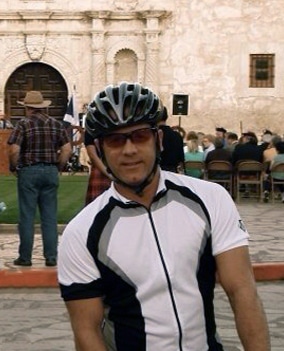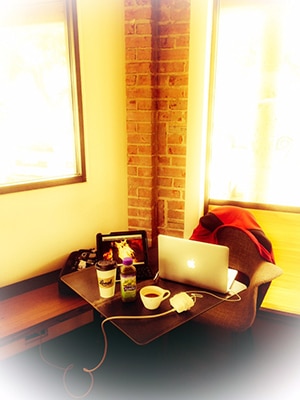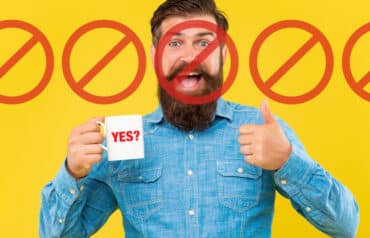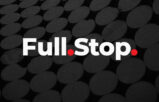Who are these “enterprising lawyers”? Actually, they are easy to spot. Look for the more engaged and happier lawyers in the crowd. Deeply invested in the power of the work they do for their clients, they have ample interests beyond the practice of law as well. And they seem to have more energy for getting things done than anyone in the crowd. You probably know one or two — you may even be one yourself!
Meet Mark Unger, a family lawyer, mediator and technologist — with a touch of the poet and a semi-permanent office in a San Antonio coffee shop. He’s surprisingly analog for a digital kind of guy. That’s him below, in front of The Alamo, training for a local bike race.
Mark I. Unger
The Unger Law Firm, PC
San Antonio, TX
St. Mary’s Law School, J.D., 1995
University of Texas at Austin, B.A., 1991 (English plus Psychology and French)
Why did you want to be a lawyer?
When I was a boy, I went to camp in the Ozarks. One year, they had a mock trial to save the environment and I got picked to play one of the two lawyers. I won, and I felt like I mattered, if even in a fake case. I forgot about this until my senior year in high school when they asked everyone, “What are you going to do with your life?” I said I was going to be a lawyer. I forgot about that again during what I call my “adult formative years,” which largely consisted of slacking off and playing golf. Finally, after deciding that I had to get out of college and do something, I took the LSAT. When I finally realized I was in, I came to the conclusion that I wanted to make a difference, and to help people, even if I can only do it one at a time.
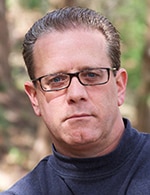
I’m a family lawyer, mediator and technologist of sorts (to borrow the phrase from the venerable Craig Ball).
I deal with people’s problems every day, week, month and year. Frequently their issues are similar, if not the same. Many judges have become so tired of dealing with these issues they seem to have cookie-cutter answers for everything or, in the alternative, to create rules designed as a disincentive to going to court. While I settle the vast majority of my cases, there are times we must go to court. This is where the focus on creativity in presenting a case is often more exciting than the case itself. It’s a way of becoming more of the writer-director-actor … of virtually becoming my clients and telling their story. The focus of my practice, then, is about finding my “true” — or that place where the most compelling facets of my client’s story become something that a judge or jury would want to be a part of. The focus is on my clients’ “true” that way, too, since helping them find that will hopefully last beyond the case and help them in their recovery from the divorce or custody fight.
What is the real reason clients hire you?
Really, I don’t know. I guess it’s because before I take a case, I tell clients that this is a matching process. It’s about being on the same page, and about respect and guidance, both from them to me and me to them. It’s a very personal thing for a business relationship. I give them as highly an interactive attorney-client relationship as I can possibly imagine. I want to know the entire story before we move forward. This entails homework on the client’s part, including creating a timeline of the relationship just as it’s crumbling, and pulling photographs, text messages and emails. It’s about finding the common patterns over the years, then figuring out what is going on behind the divorce. Then from the pattern, capturing the essence of the issues and figuring out an if/then approach. If we do this or that, will it then allow for a positive response?
I think this type of preparation let’s people feel they are in control. If I can give them more control of their life in the future, then I would guess and hope this is why they might choose me.
Who was your most important mentor and, briefly, what did he or she teach you?
I’ve had so many, really, I couldn’t possibly discount any of them. But I think the mentor who stands out most of all comes during a time of crisis, doubt or learning in our lives, so I’d have to go with my 1L Torts professor, John Teeter at St. Mary’s. Not because of what I learned about torts law, but of what it took to persevere. At the beginning of class, he would always say “Oookaay, it’s time to get started.” And there was something about that familiarity when delving into the unknown that was comforting. When he would skewer us for falling short, he would inevitably come back to his analogy of what made a good lawyer — that being one who would get a fork jammed into his or her forehead, pull it out and bring it back the next day for more. I remember once actually bringing a fork into class and setting it in front of me, so he could see that one day I’d make it. I’ll never forget him, and I never looked at a fork the same way again.
What about practicing law did you learn the hard way?
It’s the person or lawyer who wants it most who often will win. It becomes not a want or desire, but a need. It’s an obsession for some, and a hard way to live. But when someone’s existence, self-assurance or family relationship is on the line, very rarely will I be outworked or out-strategized. Of course, sometimes we have to make room for the fact that we’re human, that we’re fallible, and that we have to relearn this lesson at times.
What is your favorite technology tool?
The iPad. It changes everything, and I mean everything. I think there’s no greater tool or instrument that has made creativity both the goal and the method at the same time.
I can do everything in my practice better with my iPad. And I’m not constricted by office walls and doors and phones and a desk. I can take and create notes, create and modify Word documents, annotate PDFs, create and present timelines and PowerPoints, save and share everything. It helps push the right-brained envelope that I believe is going to separate what lawyers were, and what they will be. I know how it sounds. However, it created “touch.” It created cloud pervasiveness. It created the need for ubiquitous digital signing. It created mass consumption of dot-connecting and merging mediums. And it bridged all of this for those of us who crave art in business.
How would you describe the location and décor of your office?
I do a ton of work from wherever I happen to be. For a guy and a lawyer like me, it’s about changing my surroundings to allow me to see all sides of a case, or an obstinate attorney or CLE paper, or just life. But what I’ll call my preferred “optional virtual practice” spot is at Local Coffee in San Antonio, in one of the cuplike chairs in a corner nook. It’s where I’ve worked on my recent “Observations from the Corner Table” (a phrase I have to credit to one of my best friends, Eric Greeson).
My brick-and-mortar office is a shared space with two other attorneys, in an eight-story commercial building. My space there is about abstract thought and art, particularly a signature piece, by Eric Lee (from Chicago), that I call “Deep Blue Cie.”
Why would someone describe you as “enterprising”?
I like to quote Dennis Miller, who said “I have ADD-OCD. I’m constantly varying what I’m completely obsessed with.” The reality is that I’ll focus on something really hard, then I’ll get bored with it. But for the past five years I’ve been fascinated with the combining of things that otherwise aren’t connected … mashups, if you will. If you look at YouTube, where the kids mash up music, or Lifehacker, where you can learn how to repurpose things for household use and other things, or IFTTT, you’ll see what I mean.
I think enterprising is merely the successful combining of things that perhaps weren’t combined before and repurposing them within your particular field. I want to focus on combining things to solve problems. If I can create a workflow to mash up a client’s needs with a potential solution — whether it be transferring evidence to a virtual trial notebook wirelessly, in a batch, from their mobile device, or creating a timeline so they can see the pattern they’ve been living and suffering in and work toward something better — then that’s why I’d hope someone would describe me as enterprising.
What is the best piece of marketing advice you ever received?
I hate saying I’m good or great or better at anything. Peter Vogel, however, once told me that if you want to play pool, you’ve got to have balls on the table. Translation: To market yourself, you have to put yourself out there, even if it’s a bit uncomfortable.
What is the first thing you “check” each morning?
My back, as it creaks a little more each day; my dog, as she keeps me sane and youngish; and my coffee cup, as it is one of my great loves.
Where do you think the practice of law is going?
Efficiency, automation and convergence in the cloud. When I started out on my own in 2007, I started using Basecamp, a cloud-based project management system for web developers. I created proprietary Terms of Service (TOS) requiring that the clients maintain the security, virus protection, exclusive control and the like on their systems. I converted to e-billing, then posted the bills to the client’s extranet with standard language and a link to a branded e-commerce portal for them to pay online. All emails from opposing counsel, or other documents received and scanned, are now forwarded or uploaded to the client’s extranet. I can access the client’s case from anywhere on any device and do almost anything, including recording the billing in my own “project” for later transfer to my billing system.
S.E. Hinton wrote, “The difference is that was then, this is now.” Systems like the one I mashed up for myself are now available to others, and it’s not just that we’ve finally moved into the cloud, but it has aggregated and continues to bring together all those bespoke functions of law that prevented us from being more efficient in the past.
While I’m still fully embedded in my own virtual reality, I am in the process of moving to one of the off-the-shelf cloud-based practice management systems (I won’t say which one out of respect for them all). In the past, the key for me was not to keep all my eggs in one basket. The key now is that there are baskets that finally incorporate most, if not all, of my keys. This convergence of process, including the use of the iPad, apps, smartphones, gesture control devices, near field communication, Wi-Fi, Bluetooth, graphic presentation programs and form-generation tools, is going to propel lawyers into being hyper-efficient types who will again be focusing on the law. (Something I think we’ve gotten away from to some extent in small firm and solo practice.) This will allow us to compete with BigLaw, which has, in recent years been receding from the universal domination it once had.
Where are you personally going?
I am going to the creative — I am trying anyway. I have always wanted to do something new, something that hasn’t been done before. Often in life we get into a rut, a comfort zone, and we don’t even know it. It becomes harder as we get older to not only accept ourselves and our shortcomings, but to keep attempting change. If I can keep moving toward the creative, I can feel good about where I’ve been and where I’m going. And maybe I can help people in more ways than just drafting a divorce decree or lobbing legal grenades at the other person. The test will be whether, when the case is over, either the two people will see the other side of the rainbow and move forward, or in cases where they cannot, perhaps on the other side they’ll be less likely to want to fight so much.
What are people most surprised to learn about you?
I’m a divorce lawyer who has written poetry (specifically about love) my entire adult life. I have been sitting on a manuscript for about eight years now, mostly about the girl who got away. It’s a bit embarrassing, I suppose. I’m lucky in having another poem published by the Austin International Poetry Fair Anthology in April.
What do you use every single day that you could actually easily do without?
My car sunroof and cable TV. I suppose I don’t have to have a sunroof, but I love it and the feeling that comes from what comes through that car-sky-hole is really, really good. As I write this, my cable at home has been out for about a week. By the time they get here to fix it, and with it my steady stream of HNN and Idol, I may be able to say I can do without it. Right now, though, it seems hard to imagine.
What three things must you always have in your brief bag, desk drawer or refrigerator?
A stylus, a touch-screen cloth and Tamari almonds.
Where do you turn when things go really badly?
“Saturday Night Live.”
More About Mark
Mark I. Unger is a family law attorney and mediator, with a high focus on the interactive nature of communication with clients, attorneys and the courts via technology. His practice’s virtual component includes electronic filing and billing, client extranets and client videoconferencing.
We’re Always Looking for Enterprising Lawyers
If you’d like to suggest someone to profile, send information to merrilyn@attorneyatwork.com. To read more Enterprising Interviews, click here.
Illustration ©ImageZoo.com



